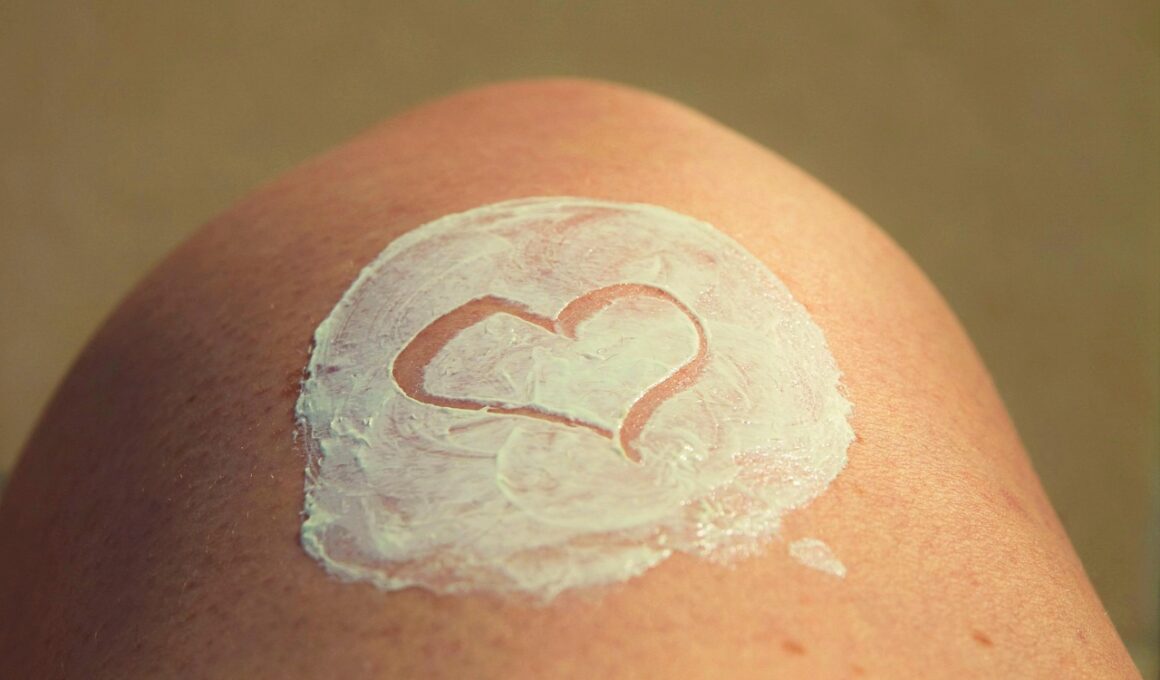How to Balance Sunscreen Use and Hydration for Maximum Protection
Hydration is critical for maintaining overall health and well-being, especially during hot summer months. When going outdoors, protecting your skin from harmful UV rays is just as essential as staying hydrated. Skin can lose moisture rapidly due to both heat and sun exposure, leading to dryness and irritation. Proper hydration helps maintain skin elasticity, contributes to a glowing complexion, and supports the skin’s natural barrier against environmental damage. Therefore, it’s essential to drink enough fluids daily, focusing on water intake, especially when planning outdoor activities in the sun. Incorporating hydrating foods, such as fruits and vegetables with high water content, can also significantly improve hydration levels. While it’s crucial to use sunscreen, make sure to hydrate before and after application. Creating a balanced routine that incorporates adequate hydration can effectively minimize skin damage and improve overall health. Keep in mind that the sun’s harsh effects can dehydrate you, so always prioritize both hydration and sunscreen to maximize protection. An informed approach to both aspects will ensure that your skin remains youthful and well-protected from sun damage, while also meeting your hydration needs.
The Importance of Sunscreen
Sunscreen is your first line of defense against ultraviolet (UV) radiation from the sun, which can cause skin damage and increase the risk of skin cancer. There are two main types of UV rays: UVA and UVB, both of which contribute to skin issues. By using sunscreen with a broad-spectrum formula, you protect against both types of rays. Apply sunscreen generously about 15 minutes before sun exposure for optimal effectiveness. Reapply every two hours, especially after sweating or swimming, as it can wear off. A higher SPF may offer enhanced protection, but it’s not an excuse to skip reapplication or other protective measures. In addition, consider using sunscreen in conjunction with other sun protection methods, like wearing wide-brimmed hats or seeking shade whenever possible. Always choose sunscreen suited for your skin type, such as oil-free formulas for oily skin or moisturizing ones for drier skin. Combining adequate hydration and good sunscreen usage creates a protective barrier, keeping your skin healthy and shielded against harmful sun exposure. Emphasizing both aspects should be central to your skincare regimen.
To balance hydrating your body and protecting your skin from the sun, it is essential to drink plenty of water throughout the day. Start your morning with a glass of water, and continue sipping fluid regularly. Aim to drink at least eight glasses daily or more if engaging in outdoor activities. Hydration needs may vary based on individual factors, such as body size, activity level, and climate. Carrying a reusable water bottle can serve as a constant reminder to drink fluids regularly. Drinking water before, during, and after sun exposure will help keep your body hydrated. Alongside water, consider incorporating hydrating beverages like herbal teas or coconut water to enhance fluid intake further. You can also consume fruits and vegetables high in water content, such as cucumbers, watermelon, oranges, and strawberries, to boost hydration and enjoy their vitamins and minerals. These foods can provide a refreshing way to stay hydrated while also providing essential nutrients for overall health. Remember, maintaining hydration while applying sunscreen complements each other in achieving maximum protection against the sun.
Effective Hydration Strategies
When practicing effective hydration strategies, it’s vital to be aware of your body’s signals. Thirst can often indicate dehydration, but by the time you feel thirsty, you may already be mildly dehydrated. Observe the color of your urine; light yellow typically indicates hydration, while dark yellow signifies you need more fluids. Also, respond to cues like fatigue or headaches, as they can signify a need for hydration. Integrating hydration into your daily routine can aid in developing healthy habits. Meal times present an excellent opportunity to enhance hydration; drinking a glass of water before meals can help you stay on track. Additionally, challenge yourself to drink a certain amount by specific times during the day. Utilizing smartphone apps to track your fluid intake may also help reinforce these habits. Furthermore, plan your day around weights, activity levels, and expected sun exposure when determining hydration needs. All these tips aim to keep your body functioning optimally, alongside ensuring proper skin protection from harmful sun rays. Prioritize hydration as an integral part of your skincare routine.
Moreover, choosing the right sunscreen plays a vital role in skin protection. Look for a sunscreen that is labeled as non-comedogenic if you have oily or acne-prone skin, as this type of sunscreen won’t clog pores. Explore mineral sunscreens, which contain natural ingredients like zinc oxide and titanium dioxide, that provide a physical barrier against UV rays; they are often gentler on sensitive skin. For those with dry skin, opt for moisturizing formulas containing hydrating components such as aloe vera or hyaluronic acid. Be mindful of expiration dates on sunscreen products, as expired sunscreen may not offer proper protection. Incorporation of additional skincare products with antioxidants can also help in counteracting free radical damage from sun exposure, further supporting your skin health. Always follow the recommended application guidelines written on your sunscreen, as disparities in application can influence its effectiveness. Balancing hydration and sunscreen use is crucial; both work hand in hand to ensure your skin receives adequate nourishment and protection against the sun’s damaging effects, ultimately enhancing your appearance and vitality.
Skin Types and Hydration Needs
Understanding your unique skin type can significantly influence hydration and sunscreen application strategies. Different skin types—oily, dry, combination, and sensitive—require tailored approaches concerning hydration and sun protection. For example, if you have dry skin, it’s crucial to prioritize frequent hydration and use cream-based sunscreens that add moisture. People with oily or acne-prone skin may prefer lightweight, oil-free sunscreens that prevent excess oil production while still ensuring skin protection. Combination skin types can benefit from customizing their products to the different areas of their faces. Sensitive skin often reacts to traditional sunscreens; hence, it’s advisable to choose formulas specifically designed for sensitive skin or natural mineral-based sunscreens. Testing new products on a small skin area before applying is critical in preventing potential adverse reactions. Regularly assessing how your skin responds to different products will help identify the most suitable options for you. Recognizing these differences will empower you to take action, ensuring both hydration and sun protection are adequately addressed, promoting healthy skin that can withstand the sun’s rays.
Lastly, remember that hydration and sunscreen use is a cyclical process where each aspect can enhance the other. For instance, proper hydration can enhance the look and feel of the skin, making sunscreen application more enjoyable. Hydrated, well-nourished skin may absorb sunscreens more effectively, giving better protection against the sun’s rays. Furthermore, when properly hydrated, your skin can better tolerate the potential drying effects of sunscreen products. Staying proactive about hydration can extend the life of your skincare products, as hydrated skin can better hold onto moisture and nutrients. Always integrate these practices into your daily routine, as staying consistent can lead to long-term skin health. Combining hydration with a diligent sunscreen regimen will not only protect your skin from UV damage but will also maintain its overall texture and appearance. Understanding how essential these components are to skincare allows you to enjoy outdoor activities without sacrificing your skin’s health. Embrace both hydration and sun protection as indispensable components of a comprehensive skincare strategy.


